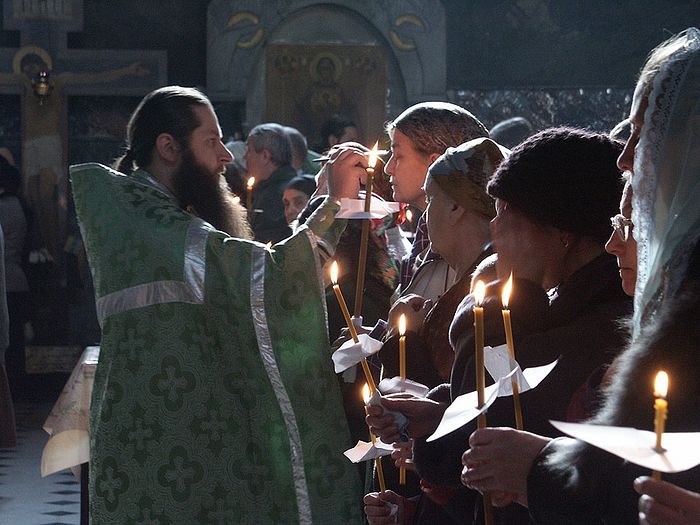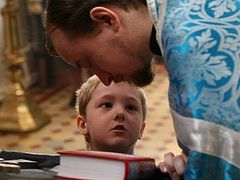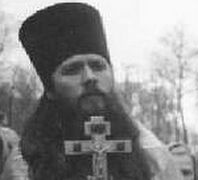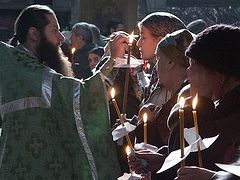As part of the special report on the “Sacraments of the Church” Archpriest Artemy Vladimirov speaks on the essence and meaning of each of the seven Sacraments: Baptism,Chrismation, Repentance, Communion, the Sacrament of Marriage, the Sacrament of the Priesthood, and Unction.
The present talk is on the Sacrament of Holy Unction, about how it is served, what is healed by this Sacrament, and who can and how often they should receive it.
Who of us, dear friends, in this prosperous twenty-first century doesn’t think about his own health?! Perhaps only teenagers, enjoying the abundance of their vitality and strength. And if you ask a young person, with milk yet wet on his lips: “What pressure do you have?” he’ll answer you: “I don’t allow anyone to pressure me,” not comprehending what you’re speaking about.[1]
So, health. “The most important thing is health.” Are you aware, dear friends, of this phrase almost sacred in the mouths of Philistines? Then again, it can be understood widely enough. There is bodily health, and there is the health of the soul—a thing immortal, as our immortal spirit is termed by our mother-Church. And one of the seven Sacraments of the Ecumenical Orthodox Church, known as Holy Unction, is, I would say, a medical , although, undoubtedly, Confession and the Sacrament of Communion also always serve for the healing of soul and body. However the Sacrament of Unction, like all the others, is firmly rooted in the fabric of the Gospel story, directly correlated to the healing of spiritual and bodily maladies.
Unfold your New Testament and you will see that Christ is the authentic Physician of Heaven and earth. Walking throughout the villages and cities of Palestine, He healed every ailment and pestilence in the people. God is Fullness, filling all with Himself. Under His hands and under the influence of His Spirit-bearing words paralytics arose from their sickbeds, the dead resurrected, leprosy until then incurable departed from the bodies of the sick, and they were purified by the power of Divine grace.
“Do not turn from a physician,” says the Old Testament sage, Jesus, the son of Sirach, “for in another time and in his hands there is success” (cf. Wis. Sir. 38:12-13). And we, of course, welcome traditional medicine. God forbid that it be commercialized to such an extent that patients would fear to step into a curative facility. But God, through our mother-Church, through the Sacraments and rites heals. He helps to deliver people repentant and prayerful from irascibility, and that means from a pressure differential. The Lord God forgives old offenses, and ulcerative conditions will leave by themselves, not reaching the state of rupture. If the soul of man is peaceful and tranquil then the body will bit-by-bit acquire strength.
So, today we are conversing about the Sacrament of Unction. Ordinarily seven priests take part in it, as a sign of the seven-fold Divine grace, the seven gifts of the Holy Spirit: the spirit of wisdom and understanding, counsel and might, knowledge and piety, and the fear of God—having gathered in good time in the church and bearing forth names in list, which batiushka will proclaim, praying together with you for your healing.
We form into rows so that the priests—the first, second … fifth … seventh can comfortably move along these rows, anointing every one of the parishioners living piously, having confessed beforehand, not finding themselves in a condition of impenitent mortal sin, anointing not the unrepentant billy goat, but the meek lamb, having reconciled with the Lord at the prefatory confession. They anoint such a lamb with oil and wine, consecrated here by conciliar prayer by the mouths of the priests during the Sacrament of Holy Unction. They anoint, as a rule, such places on the human body: forehead—for the sanctification of the mind, deliverance from intrusive thoughts, various delusions, false conceptions, and the vain whirlwind of thoughts; nostrils—olfaction; mouth—taste; eyes—vision; chest—in a cruciform shape—which is why it’s not recommended to approach the Sacrament of Holy Unction in a turtleneck or with a frilly jabot, that the priest is forced to tread some unknown path to your heart; palms and backsides of the hands. All the organs of sense, and the soul and body through the Sacrament of Holy Unction with faith in Christ the Savior and Physician are permeated with the uncreated energy of the Holy Spirit.
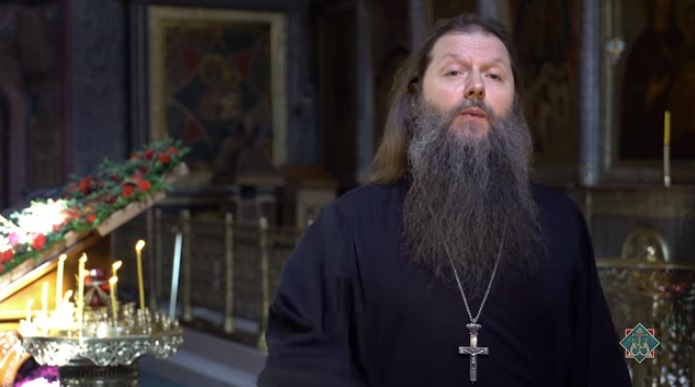 Archpriest Artemy Vladimirov
Archpriest Artemy Vladimirov During the unhurried and protracted Sacrament, when the multitude, engaged in the common current of prayer sing and hear: “Have mercy, O God. Heal us, O God. Have mercy on us, O Holy One,” the priests, one after the other read prayers that the Lord Jesus Christ Himself, invisibly serving this Sacrament by the hands of the clerics, according to our faith might touch His healing finger to the soul and body of those afflicted, deliver from all sorts of ailments spiritual and bodily, raise up in us a spirit of peace, vigor, joy, and strength, make our bodies into instruments of the creative will of God, sanctify our consciences and make peaceful our hearts.
It’s impossible to enumerate those spiritual blessings which as from a cornucopia are poured out in response to the heart of a Christian if he, during Holy Unction, calls upon the those saints whose names we hear in the prayers: the Great Martyr and Healer Panteleimon, Photios and Anicetus, Kosmas and Damian and the other Unmercenary Healers not suffocated by vulgar commerce, but serving those afflicted out of a surfeit of love. And every time when the Sacrament is finished, after the flock has fallen down upon its knees, and the priests, having opened the Book of Books—the Holy Gospel—have read, having received the grace of Unction, the prayer of absolution—we, having received Holy Unction, feel as if a great cargo has fallen off from us. We are as if inmates freed from their fetters. Located in the area of our heart, we feel a phenomenal enlightenment in our thoughts, and firstly, a deep peace, rest, joy, and happiness. The Heavenly Kingdom exists within us, when, gathered under the arch of the temple, under the sign of eternity, in unity of heart we, with our mouths, send up praise to the Lord, the Healer of afflictions. We kiss the Holy Gospel, and if the order of Holy Unction is observed we thrice bow from the waist before the clergy who remind us in that moment of the apostles—the disciples of Christ. Indeed, in the New Testament we find testimony that the disciples received from Christ the empowerment, the blessed authority and power to heal in people any infirmity and any ailment and that they anointed the suffering with oil.
The mysteries of the God-established Unction are so gladsome and blissful that my tale is deficient for relating them all. I wish that all of you, dear friends, would desire and manage in one of our monasteries or parish churches to participate in this luminous Sacrament. But I will give you one piece of advice: don’t bring “from the street” your “nodding” acquaintances or co-workers who never had occasion to cleanse their conscience in the Sacrament of Confession. Holy Unction, as one of the light-bearing Sacraments, may serve for the condemnation of a man, finding himself in a wanton union, or sinning in adultery, or till now not comprehending why obscene cursing is incongruous with the status of a cultured person speaking in literary Russian language.
How many times a year is it advisable to receive Holy Unction? There are different traditions in this respect. We would not be mistaken if we answered: no more often than once a year do the children of the Church seek to approach this solemn healing. And is it possible more often? Why not? We’re all people, we’re all human. When some kind of ailment appears and you feel a weakening of your vital powers it’s a valid pretext for again receiving the grace of Unction. I remember in the reminiscences of pious pilgrims to Optina Pustyn in the end of the nineteenth and beginning of the twentieth centuries it is said that the Optina elders blessed several times a year to take part in this Sacrament.
One way or another, we await you, dear friends, in this blessed time of the Dormition Fast. Those thirsting come to the Church of God and take freely the water of Life. Christ the Savior is the true Doctor Who came not to the righteous but to sinners, hoping for repentance, and our Lord is needful not to those who consider themselves healthy, but the ailing, that is, those feeling the weight of their infirmities, both bodily and spiritual.

